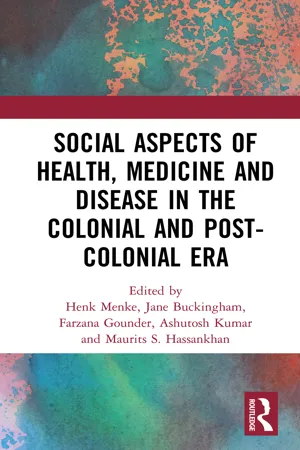
Social Aspects of Health, Medicine and Disease in the Colonial and Post-colonial Era
- 262 pages
- English
- ePUB (mobile friendly)
- Available on iOS & Android
Social Aspects of Health, Medicine and Disease in the Colonial and Post-colonial Era
About This Book
From the 1600s, enslaved people, and after abolition of slavery, indentured labourers were transported to work on plantations in distant European colonies. Inhuman conditions and new pathogens often resulted in disease and death. Central to this book is the encounter between introduced and local understanding of disease and the therapeutic responses in the Caribbean, Indian and Pacific contexts.
European response to diseases, focussed on protecting the white minority. Enslaved labourers from Africa and indentured labourers from India, China and Java provided interpretations and answers to health challenges based on their own cultures and medicinal understanding of the plants they had brought with them or which they found in the natural habitat of their new homes. Colonizers, enslaved and indentured labourers learned from each other and from the indigenous peoples who were marginalized by the expansion of plantations. This volume explores the medical, cultural and personal implications of these encounters, with the broad concept of medical pluralism linking the diversity of regional and cultural focus offered in each chapter.
Please note: Taylor & Francis does not sell or distribute the Hardback in India, Pakistan, Nepal, Bhutan, Bangladesh and Sri Lanka.
Frequently asked questions
PART 1
CULTURAL ENCOUNTERS, PLURALISM AND HEALTH CARE
CHAPTER 1
‘Colonial Care’
Health and Healing for Indentured Migrants during the Journey from India to the Sugar Colonies 1830-1920*
Introduction
Health in the Literature
Table of contents
- Cover
- Half Title
- Title Page
- Copyright Page
- Table of Contents
- Foreword
- Introduction
- Part 1: Cultural Encounters, Pluralism and Health Care
- Part 2: Pluralism and Ethno-Health Practices
- Part 3: Leprosy in Plural Contexts
- Note on Contributors
- Index